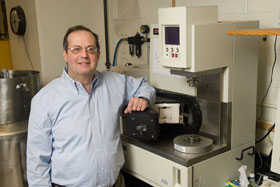  |
| HOME | THIS ISSUE | CALENDAR | GRANTS | BACK ISSUES | < BACK | NEXT > |
UConn scientists work to develop environmentally friendly materialsby Scott Brinckerhoff - February 19, 2007 | ||||
| With more than $500,000 in grant funding, UConn is one of six public universities in New England that is benefiting from a national focus on “green chemistry” as a way of preserving resources while reducing waste and the generation of hazardous materials. Green chemistry’s focal point is to use renewable resources, such as agricultural products, rather than petrochemicals to fill many of mankind’s needs.
Or answering the question, “Can I make a plastic using something I can grow?” as Professor Bob Weiss puts it. Weiss, Board of Trustees Distinguished Professor of Chemical, Materials, and Biomolecular Engineering, and his colleagues, are working at the molecular level to try to answer that question. Their approach is to synthesize new “polylactic” polymers based on lactic acid, a natural substance found in corn and dairy products. The UConn team is building on the success of companies like Cargill, whose Natureworks business is marketing new products ranging from plastic tableware and fabrics to “feathers” in pillows, all made with a process that starts with corn instead of petroleum. Green chemistry is well beyond the research stage, Weiss says. He notes that at next year’s Olympic Games in Beijing, people will use throwaway eating utensils able to be composted without harming the environment, even though they may not be biodegradable. UConn and the other New England universities are advancing the science of green chemistry by making new, useful, and environmentally friendly polymers. Polymers are long chain molecules that occur both naturally and synthetically. Examples of polymers are legion. They include biological molecules, such as human DNA or the materials that compose a turtle’s shell, and synthetic materials with applications as diverse as a skateboard’s wheels and acrylic paint, to high-performance composites for aerospace, or conducting membranes for energy applications. Weiss’s funding comes from the Environmental Protection Agency, the National Science Foundation, and the New England Green Chemistry Consortium, a collaboration of the six land-grant New England universities. He is working with Tom Seery, associate professor of chemistry, and Sam Huang, professor emeritus. UConn chemists first became involved with green chemistry through Professor Steve Suib, the department head, a decade or so ago. At that time, much of the focus was on how to recycle polymers such as milk and soda containers that last essentially forever if tossed into a landfill. Today, the UConn researchers are trying to develop materials called ionomers that will allow different polymers to blend or bind with each other, creating a new material. The ionomers have applications as gels, coatings, adhesives, and membranes and, in some instances, as commodity plastics, Weiss says. “If I tried to mix nylon into polylactic acid, it’s not going to work,” he said. “But if I add a specific mixing agent, then it will work. That is what the ionic groups of an ionomer do – by adding an elastomeric ionomer to nylon, we can create a super tough nylon.” The ultimate goal is to develop new materials that respect the earth’s environment in any of several ways. For example, if the materials don’t require petroleum, that is obviously good from conservation, economic, and perhaps political points of view. If they can be cleanly incinerated to produce power, that’s a plus. If they can be recycled, composted, or reduced to something benign via biodegradation, so much the better. Weiss says new “green” materials have to function at least as well as existing, less environmentally friendly materials. “A product that’s brittle or begins to biodegrade before we can use it won’t do anybody much good,” he says. Any “green” products have to appeal to consumers’ pocketbooks too, he says. Weiss notes that products like recycled paper often cost more than the higher quality non-recycled variety. He sees this changing, as manufacturers compete to supply “green” products and consumers gravitate toward them. Meanwhile, one “green” Connecticut product line is taking off in the marketplace, thanks in part to some technical assistance from UConn. Advanced Power Systems International (APSI) of Lakeville is marketing a technology that reduces fuel consumption, maintenance, and emissions in boilers and other power plants, including automotive engines and even lawnmowers. “We knew our Fitch Fuel Catalyst did what we say it does, but explaining exactly how it works was a challenge,” says Al Berlin, a chemist with the company. “Professor Suib’s group was a delight to work with. They, including students, were wonderful in helping us analyze and understand all the science behind the product and conveying that to potential customers.” APSI President Mike Best adds, “Our relationship with UConn is by far as good as any company could hope for. When we go out to customers such as housing authorities and are able to show analysis from an institution with UConn’s credentials, it’s very helpful.” Indeed, an independent study recently showed that Fitch Fuel Catalysts, set to be installed in New York City public housing boilers, will reduce harmful air emissions and carbon buildup in the boilers, while also increasing the heat energy from each gallon of fuel. |
| ADVANCE HOME UCONN HOME |

